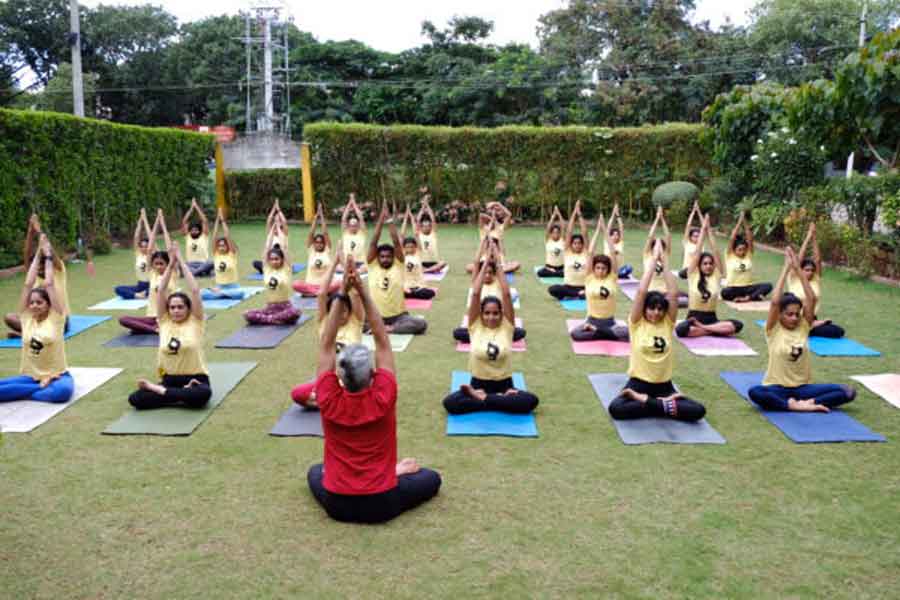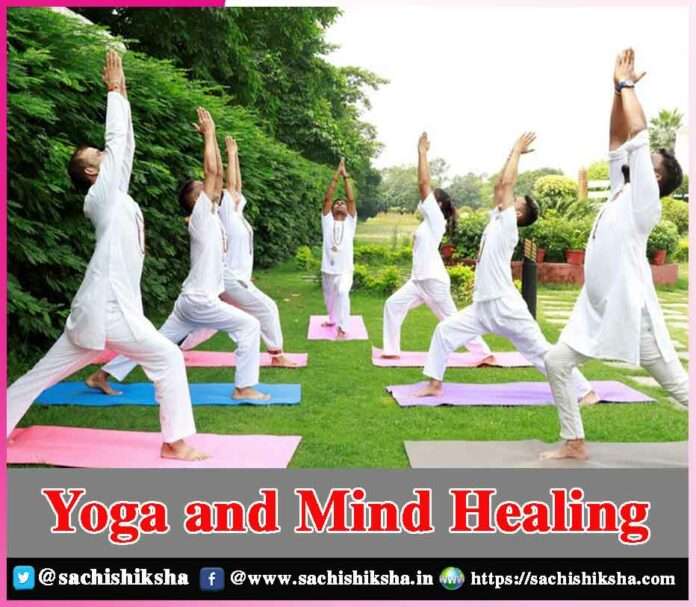oga and Mind Healing
Introduction: In a world marked by constant hustle and bustle, where stress, anxiety, and mental health issues have become commonplace, the search for inner peace and mental healing has never been more crucial. While modern medicine offers an array of treatments for mental health concerns, many are turning to ancient practices like yoga as a means of achieving mental well-being.
With its origins in India, yoga has crossed cultural barriers and become a potent aid for both physical and mental well-being. We shall investigate the significant relationship between yoga and mind healing in this essay, examining the ways in which this ancient practice can contribute to our overall mental well-being.
Also Read:
- Yoga and Mind Healing
- Yoga and Mind Healing essay
- Yoga Se Hoga: “Yoga for health, Yoga at home
- Face Yoga To Keep Wrinkles Away
- Benefits of Hand Yoga
Table of Contents
The Mind-Body Connection in Yoga:

One of the primary ways in which yoga promotes mind healing is through mindfulness. Mindfulness is a mental state characterized by full presence in the current moment, without judgment or distraction. In yoga, practitioners are encouraged to focus on their breath, the sensations in their bodies, and the present moment during each pose. This practice cultivates mindfulness, helping individuals to become more aware of their thoughts and emotions. Over time, this increased self-awareness can lead to a better understanding of one’s mental state and the ability to manage it more effectively.
Furthermore, yoga postures, or Asanas, are designed to release physical tension and promote relaxation. This physical relaxation often translates into mental relaxation, reducing stress and anxiety. Many yoga poses involve gentle stretching and deep breathing, which activate the body’s relaxation response, which lowers stress hormone production and fosters calm.
Stress Reduction Through Yoga:
In this fast-paced world stress is a common problem, and chronic stress can have severe consequences for mental health. Yoga offers an effective way to combat stress and its detrimental effects.
One of the primary ways in which yoga reduces stress is by promoting relaxation. As mentioned earlier, the practice of yoga postures and controlled breathing triggers the body’s relaxation response. This, in turn, lowers blood pressure, slows heart rate, and reduces muscle tension. By regularly practicing yoga, individuals can develop a greater capacity to manage stressful situations and cope with daily life pressures.
Moreover, yoga provides an opportunity for individuals to detach from their everyday worries and concerns. During a yoga session, the focus on the breath and the body’s movements helps divert attention away from the stressors of daily life. This temporary reprieve from stress can have a significant impact on mental well-being, allowing individuals to return to their daily routines with a clearer and more relaxed mind.
Emotional Regulation and Yoga:
Emotions are a fundamental part of the human experience, and their proper regulation is essential for mental health. Yoga has the potential to be a potent technique for improving emotional control and wellbeing.
The practice of yoga encourages individuals to become more in tune with their emotions. As practitioners develop mindfulness and self-awareness, they gain a better understanding of their emotional responses. This heightened awareness allows individuals to identify and address negative emotions more effectively.
Yoga also teaches individuals to respond to their emotions in a healthy and constructive manner. Instead of suppressing or avoiding difficult emotions, yoga encourages individuals to acknowledge and accept them. This acceptance is an essential step in the process of emotional healing and growth. Through yoga, individuals can learn to let the harmful patterns of emotional suppression go and develop healthier coping strategies.
Yoga and Anxiety Management:
Millions of people around the world struggle with anxiety issues, and the continual worry and fear that come with it may be crippling. Yoga can help you manage your anxiety.Yoga’s emphasis on controlled breathing is particularly beneficial for individuals with anxiety. The body’s relaxation response is triggered by deep, calm, and purposeful breathing, which can offset the physiological impacts of worry. Regular yoga breathing exercises can help people control their anxiety symptoms and lessen both the frequency and the severity of anxiety attacks.
Furthermore, yoga can be an effective path to address the cognitive aspects of anxiety. Through mindfulness and meditation practices, individuals can gain greater control over racing thoughts and excessive worrying. By learning to stay present and focus on the here and now, individuals with anxiety can reduce the mental turmoil that often accompanies the condition.
Depression and Yoga: A Healing Connection:
Depression is another mental health condition that affects millions of people globally. While yoga is not a substitute for professional treatment, it can complement existing therapies and offer individuals with depression a valuable tool for managing their condition.
One of the key benefits of yoga for depression is its ability to boost mood and increase feelings of well-being. Endorphins, the body’s naturally occurring feel-good hormones, are released as a result of the physical postures and movements used in yoga. Regular practice can lead to an improved overall outlook on life, making it an excellent adjunct to traditional depression treatments.
Moreover, yoga encourages self-compassion and self-acceptance, which can be specifically beneficial for individuals struggling with depression. The practice of non-judgment and self-kindness in yoga aligns with principles often used in cognitive-behavioral therapy, a common treatment for depression. By incorporating these principles into their yoga practice, individuals can work on changing negative thought patterns and improving their self-esteem.
Yoga as a Path to Self-Discovery:
Beyond its immediate mental health benefits, yoga also offers individuals a path to self-discovery and personal growth. The journey of yoga often involves exploring one’s inner world, uncovering hidden strengths
As individuals practice yoga, they may encounter emotional and psychological challenges on the mat. These challenges can serve as valuable opportunities for self-reflection and personal growth. Yoga teaches individuals to face these challenges with courage and resilience, ultimately helping them build emotional strength and resilience in their daily lives.
Additionally, yoga philosophy encourages individuals to live a life aligned with their values and inner truths. This alignment can lead to a greater sense of purpose and fulfillment, contributing to overall mental well-being.
Consult Qualified Mental Health Professional:
Although yoga can be an effective therapy for improving mental health, it’s important to note that, when necessary, it does not take the place of expert mental health care. Individuals with severe mental health conditions must seek guidance and treatment from qualified mental health professionals. However, for many, yoga can be a complementary practice that supports and enhances their mental well-being.
Conclusion:
Incorporating yoga into one’s daily routine, even in small doses, can have a positive impact on mental health over time. Whether you are seeking relief from stress, looking to manage anxiety or depression, or simply seeking greater self-awareness and inner peace, yoga offers a path to healing the mind and nurturing the spirit. As you unroll your yoga mat and begin your practice, remember that you are taking a significant step toward a healthier, happier, and more balanced life.













































